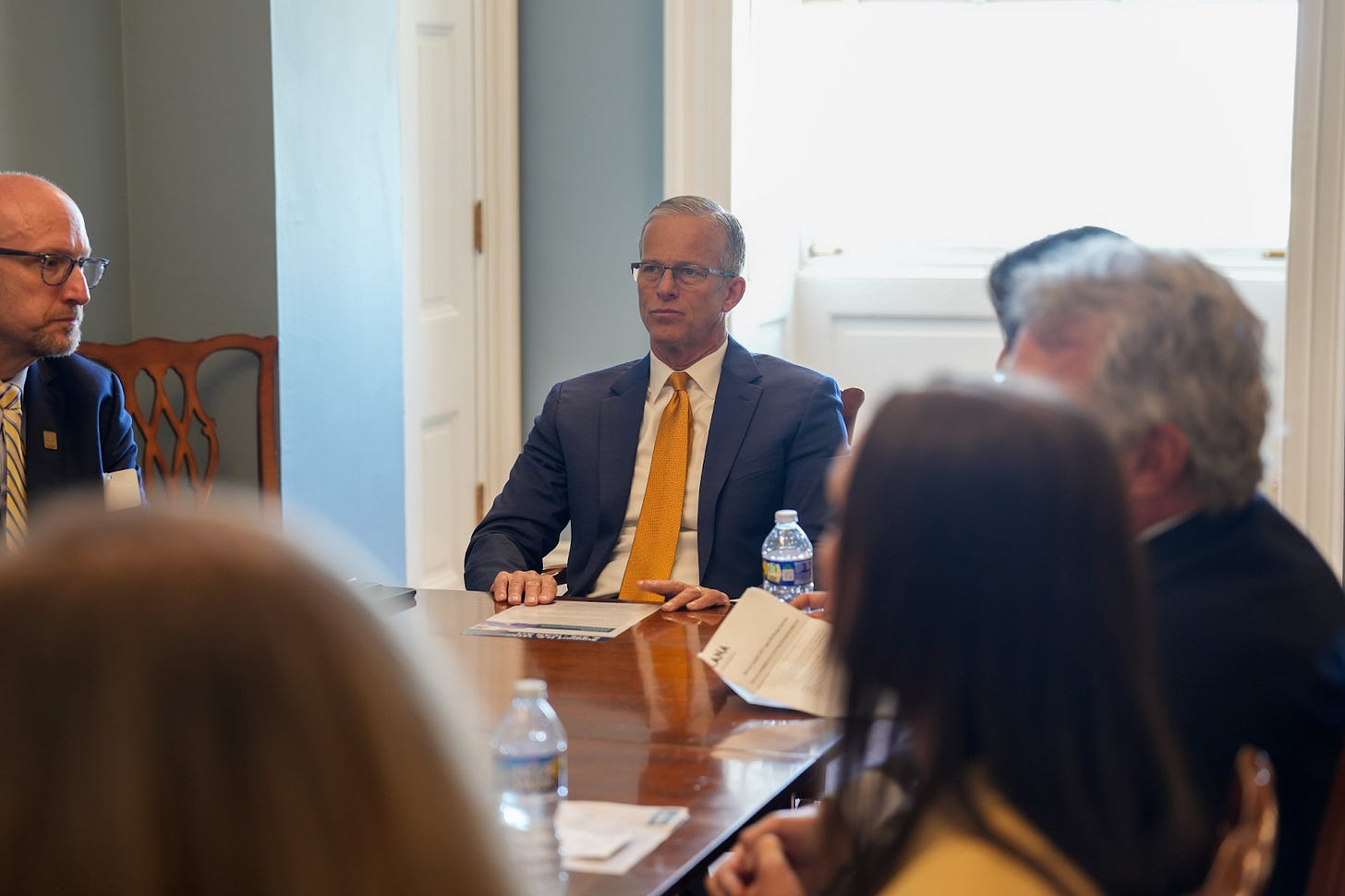Does the Senate Have Time for GENIUS?
Veronica Irwin joins the newsletter as a Wednesday columnist, and wonders if the Big Beautiful Big is too big for crypto legislation.

I started Brogan Law to provide top-quality legal services to individuals and entities with questions related to cryptocurrency. Cryptocurrency law is still new, and our clients recognize the value of a nimble and energetic law firm that shares their startup mentality. To help my clients maintain a strong strategic posture, this newsletter discusses topics in law that are relevant to the cryptocurrency industry. While this letter touches on legal issues, nothing here is legal advice. For any inquiries email aaron@broganlaw.xyz.
Brogan’s Note: I’m extremely pleased to announce that Veronica Irwin has joined the Brogan Law Newsletter as a weekly columnist. Veronica is a highly accomplished reporter who previously wrote for Unchained and Forbes, has bylines in The Nation and Fast Company, and was recently featured as an expert on the cryptocurrency industry on the BBC. Her reporting is incredible and I’m really excited to see the inside cryptocurrency information that she’ll break here in the coming weeks.
Here is how it is going to work. Every Sunday, I’ll post as usual. But now, on Wednesdays (Thursday this week because of the holiday), Veronica will post a column too. We’re covering D.C. now, but aren’t stopping there. If there are any topics that you’re interested in getting the inside scoop on, let us know. I’m not sure how long we’ll publish a second weekly newsletter here, but at least for the next couple months. SUBSCRIBE to hear the latest first. With that, I’ll hand it over to Veronica.
Too Big, Too Beautiful?
Over the past few weeks, the cryptocurrency policy world has turned its attention to Washington D.C. as two pieces of legislation, GENIUS and Market Structure, progressed through Congress. As it turns out, though, another law might decide the industry’s legislative fate.
Last Wednesday night, the House passed the Big Beautiful Bill (“BBB”), the oversized, highly-politicized federal spending and tax bill, which contains most of Donald Trump’s legislative agenda.
BBB has outsized importance to the Trump administration because the dynamics of its slim Congressional majority mean that, without bipartisan support, it can only pass a single bill annually through the baroque budget reconciliation process.
As a result, the Senate’s attention between now and August could easily drift from the cryptocurrency legislative agenda, which, despite having bipartisan support, is a lesser priority. The BBB is so-named in-part because it is really, truly big.1 The tax cuts and slashes to federal spending it incorporates are highly controversial, and virtually certain to give rise to disagreement among members of Congress. And if they’re arguing over the details in the BBB, they won’t be talking about GENIUS. Over the past week, I’ve spoken to dozens of insiders, including five crypto lobbyists and two Congressional staffers, and concern is widespread.
“Is the Big Beautiful Bill going to tank GENIUS?” one crypto lobbyist monitoring the situation speculated in a conversation last week. “Possibly.” Time on the Senate floor is a limited resource, and it might be running out.
Procedural Uncertainty
Part of the issue is the “open amendment process” — an approach the Senate sometimes takes to modifying legislation wherein any Senator can offer changes to the law on the floor. Senate Majority Leader Thune has privately committed to this approach for GENIUS. But some insiders see the approach as amateurish, as a seasoned political operative in the space told me last week. “This is when it would be nice to have someone who’s been in the [Senate Majority Leader] job a while.” Thune replaced Kentucky Senator Mitch Mconnell as Majority Leader just last year.
But “open amendment,” as a Senate staffer put it, is an “amorphous phrase.” If Thune does pursue a truly wide-open amendment process, he will be inviting delay. Indeed, sources say Thune “campaigned” on running this process in order to persuade some of the chamber — primarily centrist Democrats — to vote yes on the cloture vote they had initially rejected earlier this month.
With that said, it is possible to conduct the process in a less than fully open manner. A document circulated among Senate Republicans (lets call it the “Republican Cloakroom Document”) by leadership last Thursday, that I was able to obtain and review, prepared the chamber for a more closed-amendment process called “filling the tree,” whereby the majority leader pre-approves specific legislative text for consideration. There is disagreement as to whether this approach will be followed or not, but it is possibility.2
Such a process would save time, but also runs the risk that some Senators will vote “no” on the final bill text on the basis that they didn’t get ample time to voice their complaints. And mind you, process concerns were one stated reason that Democrats initially rejected cloture on GENIUS. It’s very possible they would do it again.
Three sources of mine who had heard about the potential switch to a closed-amendment process rated it as less than certain, and doubted that it would prove a fix for the floor time problem anyway. One source, who is in frequent communication with staffers for South Carolina Senator Tim Scott, North Carolina Senator Thom Tillis, and Tennessee Senator Bill Hagerty, said on Tuesday that the odds of an open or closed amendment process was “50/50.” By Wednesday morning, insiders suggested Thune was leaning towards offering an amendment in the form of a substitute — i.e., replacing the bill text with another, hoping to address some of the open issues. This substitute amendment would likely be introduced by Senator Hagerty, according to a Senate staffer.
Ultimately, while there are many different procedural routes Thune could take, the need for Democrats’ votes gives them the cards. These negotiations are occurring in private, and several of the intervening steps are politically unsavory for Democrats. The Senate staffer I spoke to told me to think about this like landing a plane: “We’re flying, and the destination in sight, and they’re coming in for the landing,” he said. “But there’s a bunch of things that could occur between now and when that plane is landed. We know what the procedure is to land the plane — but it is very possible that this plane could crash.”
None of the aforementioned Senators’ press offices, nor Thune’s, responded to requests for comment.
Potential Amendments
If the Senate does proceed with an open-amendment process, poison-pill amendments from unfriendly parties are certain. Expect something from Elizabeth Warren or Warren-aligned, tough-on-crypto Democrats to prohibit the president, his family, or other senior White House officials from profiting off of crypto, for example.
The Republican Cloakroom Document also lists two potential amendments from Texas Senator Ted Cruz, one amendment from Alabama Senator Tommy Tuberville, two amendments from Kentucky Senator Rand Paul, and one from Kansas Senator Roger Marshall. It doesn’t provide any context about what these amendments would be, but three separate lobbyists told me to expect one of them to propose a prohibition on public tech companies from issuing stablecoins, since this has become a big issue not only for some Democrats but also for Missouri Republican Josh Hawley.
Lobbyists are the most concerned, however, with another amendment that isn’t listed in the document: Illinois Democratic Senator Dick Durbin and Connecticut Democratic Senator Chris Murphy are mulling language that would fold-in aspects from the 2023 Credit Card Competition Act (CCCA). That language requires financial institutions to enable multiple credit card networks to be used on their credit cards instead of just one, theoretically breaking up the Visa/Mastercard duopoly.
The CCCA language could scramble the vote count for GENIUS by placing Senators who have been supportive of GENIUS but receive bank lobby backing in a tough spot (three of my sources have identified Tillis himself as a flight risk, for example).3
Last, many in the crypto community are hoping for an amendment that gets rid of the prohibition on yield-bearing stablecoins currently included in Section 4(a)(11) of GENIUS. Some of these crypto policy advocates (including Digital Chamber CEO Cody Carbone in Monday’s newsletter) blame this language on bank lobbyists who were allegedly threatened by the competition high-yield stablecoins pose to traditional bank deposits.
The folks I speak to have been telling me for weeks that the opportunity to course-correct on yield-bearing stablecoins is long gone, however — there just doesn’t seem to be much political will to pivot now, they say, and crypto’s best shot at reversing it will be in separate legislation down the line.
Stablecoin expert and NYU professor Austin Campbell, who is critical of the prohibition on yield, believes the cryptocurrency industry should still support GENIUS despite the prohibition. “We can’t let perfect be the enemy of the good,” he said. “While yield should be permitted, it’s definitely better to pass a bill now, as the market forces will eventually solve this problem or Congress will face a revolt from the voters as they see giant executive bonuses while they get nothing.”
A Healthy Dose of Optimism
After reporting this story, I’m less sure than ever that the GENIUS Act is going to pass. I know that for many in the crypto industry the GENIUS Act is the most important issue right now, but if you glance at mainstream Congressional coverage, you’ll see pretty quickly that the Senate has bigger fish to fry with the BBB. I’m not envious of the decision Thune has to make, and I would not be surprised if GENIUS dies in the Senate. The cryptocurrency may be forced to revert to its next-best option: passing the STABLE Act in the House first.
But not everyone agrees with my doom-and-gloom assessment. Chris Perkins, President of CoinFund, for example, told me that he expected Trump to push Congress to get both the Big Beautiful Bill and GENIUS done in due time. “Are stablecoins as important as the big beautiful bill? No, we have to fund the government,” he explained. “But are they still important for the Trump administration? Hugely.”
That sentiment echoes what Bo Hines told me last week. “The GENIUS Act is still a top priority for the President.” He didn’t care to elaborate.
A Quick Dispatch from Solana Accelerate

Last week, entrepreneurs, builders, and developers got together in New York to talk shop at Solana Accelerate. I expected to stumble through a raft of technical conversations that my policy-centered brain struggles to understand. But boy, was I wrong — there was plenty of policy talk to go around!
The Solana Policy Institute (SPI) convinced Senators Kirsten Gillibrand, Bill Hagerty, French Hill, and Rick Scott, Representative Torres, White House crypto liaison Bo Hines, and CFTC Commissioner Summer Mersinger to leave DC for the event — no small feat, given the chaos in Washington. Their speaches were mostly as expected: lots of optimism about crypto legislation, and occasional barbs at their colleagues across the aisle (Hagerty, for example, said negotiating with Democrats has been “incredibly challenging,” while Gillibrand had a few criticisms for Trump).
But what’s more notable, I think, is the signal these members sent by dedicating their time not just to a crypto conference, but to a conference celebrating Solana — a singular, Layer-1 blockchain that is rapidly becoming an influential voice in Washington. In addition to those on stage, House Minority Leader Hakeem Jeffries and New Jersey Representative Josh Gottheimer were seen shmoozed at a political fundraiser before an SPI event on Friday, too, underscoring Solana’s influence.
Solana has apparently invested heavily in forming SPI — one lobbyist said that the group was throwing “bags of cash” around the district, though it’s hard to track SPI’s funding since it’s a 501(c)(4). The fledgling group has managed to recruit some of the most respected names in cryptocurrency lobbying away from prominent roles elsewhere. Miller Whitehouse-Levine, former DeFi Education Fund CEO, is now SPI’s CEO. Kristin Smith, former CEO of the Blockchain Association, is SPI’s President. And Colin McLaren, former Engagement Director for the Cedar Innovation Foundation, is Engagement Director.
The crypto lobby is fracturing, and it’s worth keeping tabs on which groups are cozying up to politicians and regulators in Washington these days. These members of Congress clearly think it’s important to keep the Solana community on-side. We will see how Ethereum-aligned groups respond.
Brogan Law is a registered law firm in New York. Its address and contact information can be found at https://broganlaw.xyz/
Brogan Law provides this information as a service to clients and other friends for educational purposes only. It should not be construed or relied on as legal advice or to create a lawyer-client relationship. Readers should not act upon this information without seeking advice from professional advisers.
But mostly because people think it is funny to say.
A source familiar with Thune’s thinking said that the document itself does not necessarily indicate a closed amendment process. Rather, the document indicates what amendments Senators will be offering so that process decisions can be made. “The leader has been clear he plans to have as open of an amendment process as possible,” the source explained. How open is possible remains to be seen.
While also potentially persuading populists on both sides of the aisle to be more supportive of GENIUS, too. For that, my sources have their eyes on how Hawley, who has also proposed capping credit card interest rates, responds.








